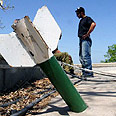
Is it the third intifada yet?
If third intifada is after pullout, what's going on now?
In the last weeks, a 28-year-old Israeli man was shot dead by Islamic Jihad terrorists while driving to work in the West Bank; a soldier was killed on the Philadelphi Route between Gaza and Egypt - a route that, along with the rest of Gaza, Israel is scheduled to relinquish in two months; mortars and Kassam rockets were fired at soon-to-be-dismantled Gaza settlements; a female suicide bomber was caught on her way to blowing herself up in a hospital in Beer Sheva, two teenage hitchhikers were shot dead near Hebron - and those are just some of the incidents.
While most Israeli security experts assume that a “third intifada” will break out soon after the disengagement in August, one doesn’t know what to call the current surge of violence.
Although such incidents have never stopped since the Sharm-al-Sheikh summit between Ariel Sharon and Mahmoud Abbas last February (in which Abbas proclaimed: “we agreed that all Palestinians will stop all acts of violence against all Israelis everywhere”), they are intensifying as the disengagement draws closer, and the various Palestinian terror groups itch to demonstrate that Israel is being forced to withdraw under fire.
In any case, the present nameless spate of violence already exceeds the first intifada in lethality. During the first intifada, which occurred during 1987-1993 and mostly involved stone- and Molotov cocktail-throwing and riots, Israeli leaders often announced that the use of “neshek ham” or “hot weapons” like guns and bombs, was a red line that, if crossed, would prompt a sterner Israeli response.
What do Palestinians want?
Today, though, the Palestinians’ use of neshek ham does not even qualify for intifada status; it’s daily, constant, and routine.
What do the Palestinians want? The first intifada was widely seen in the world, and by many in Israel, as a protest by frustrated, desperate people against Israeli rule of the West Bank and Gaza and building of settlements there. It was this perception that set the stage for the Oslo process, which was based on the tenet that the Palestinians had limited goals of statehood in the West Bank and Gaza while realistically accepting the existence of powerful Israel within the 1967 borders.
When Oslo collapsed into the suicide bombings and horrific violence of the second intifada of 2000-2004, some of the devotees of “process” adjusted their perceptions and allowed that Yasser Arafat was perhaps a flawed individual and not the best candidate for peacemaking with Israel.
Others, though - including most Europeans and some in America and Israel - still held Israel ultimately responsible even for the attacks on its own buses, discotheques, and pizza parlors, saying that Ehud Barak’s offer in 2000 of a Palestinian state in virtually all the territories had not been generous enough, or that it was continued Israeli settlement activity that sparked Palestinian rage.
But in 2004, two events occurred that removed even these props of the “process” believers. Early in the year, Prime Minister Ariel Sharon announced his intention to eliminate 21 Israeli settlements in the Gaza Strip and four in the northern West Bank, while repeatedly stating his willingness to go on from there to the road map, which entails further Israeli land withdrawals and settlement evacuations.
Dramatic declarations
The drama of the declarations was enhanced by the fact that for decades Sharon had been the driving force behind the settlement movement. And, late in the year, Arafat died and was replaced by Mahmoud Abbas, almost universally hailed as a moderate because of statements he had made against the Palestinians’ use of violence during the second intifada.
What, then, explains the ongoing attacks? Arafat is gone; Sharon has very little to say to the Israeli people except to restate his iron determination to proceed with the disengagement at all costs - which already include serious internecine strife and could escalate to near-civil war conditions.
Yet not only do the shootings, rocket fire, and suicide-bombing attempts continue, but Hamas, the Islamist group that more often and explicitly calls for Israel’s destruction than Arafat and Abbas’s “establishment” Fatah, is only gaining popularity among Palestinians as witnessed by its triumphs in recent municipal elections.
Some of us have claimed all along that, even if before 1993 there were possibilities of accommodation with pragmatic “inside” Palestinians, the 1993 importation of Arafat’s PLO - and especially the transfer of Palestinian communications and education to its control - has further radicalized the population and put paid, for now, to any hope of moderation toward Israel.
From this standpoint, Abbas’s accession to power last fall promised precisely nothing. First of all, he is himself an orthodox PLO ideologue who swears by the “right of return” that would dissolve Israel demographically; second, even if he wants to pursue a pragmatic strategy that eschews violence, he is powerless to do so given the chaotic, militia-ridden Palestinian Authority that he inherited from Arafat.
Stubborn denial
The facts on the ground starkly bear out all these arguments. What remains, though, of the “peace process” mentality is a stubborn denial that Israel is just under jihadist assault and has a duty to defend itself.
Rather than admit that, it is preferable to “strengthen” Abbas by releasing hundreds of terrorists from Israeli prisons, while the U.S. administration resumes the mantra that he, like Arafat before him, must “do more” to rein in the violence - even as, like Arafat before him, he does (at best) nothing at all and the Israeli death toll grows along with the gathering storm clouds of the “third intifada.”
P. David Hornik is a freelance journalist and translator living in Jerusalem. He can be reached at [email protected]










